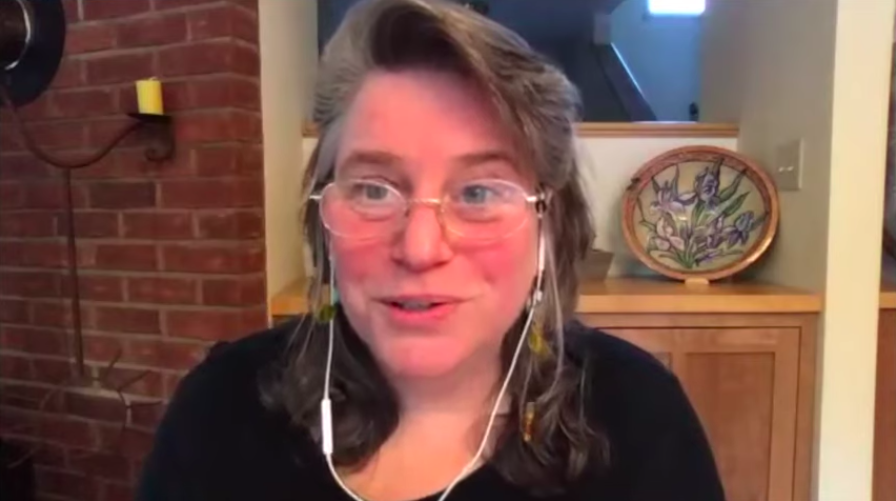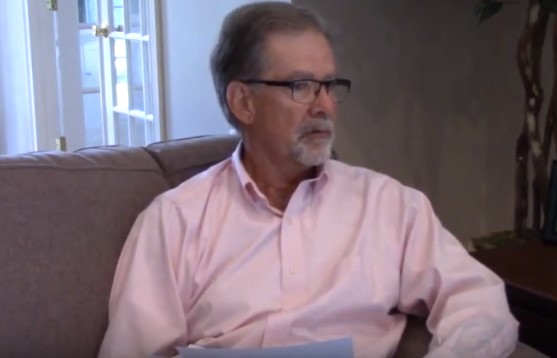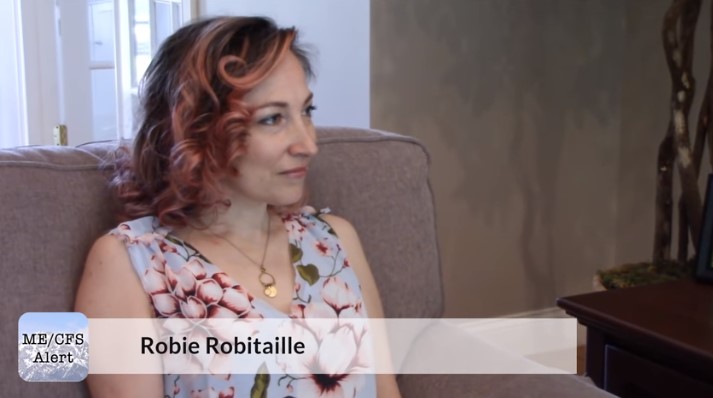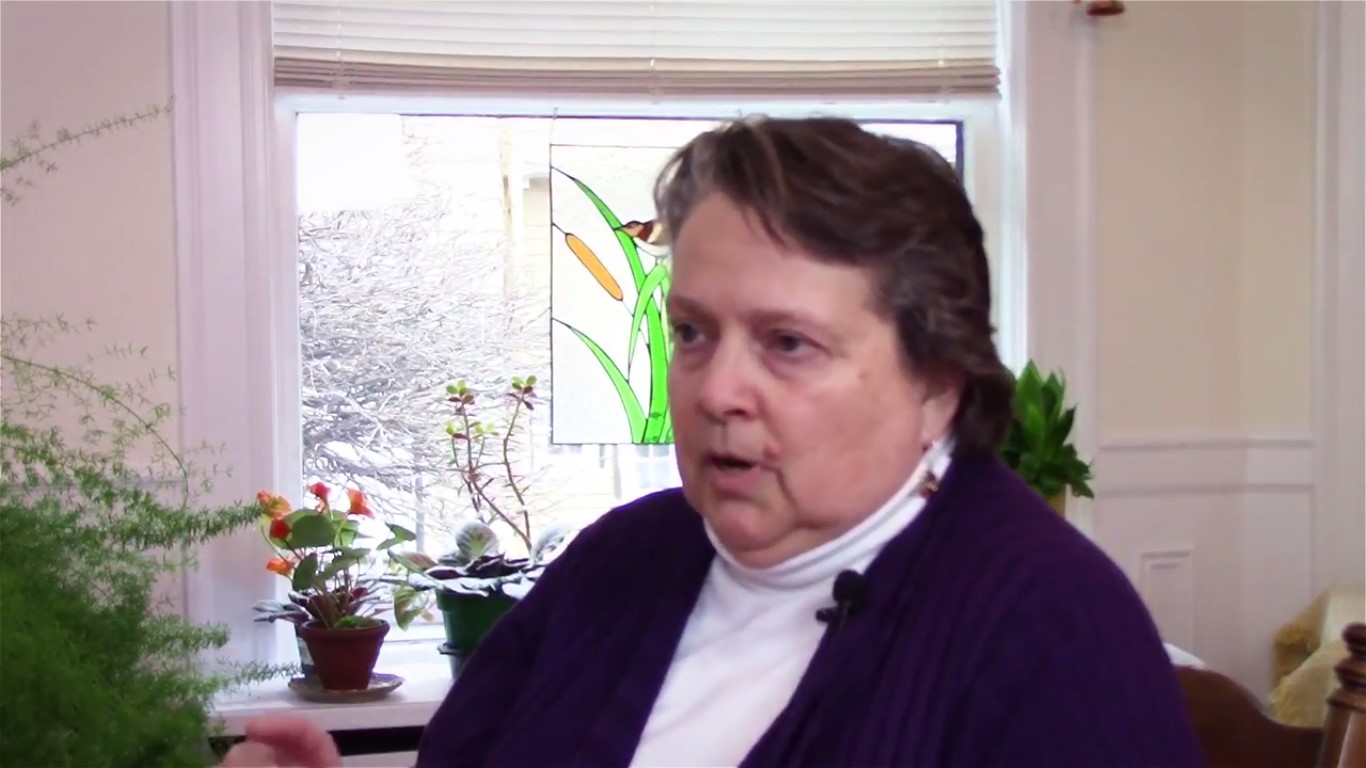Books & videos
Then: A Conversation With Myself by Elizabeth Glixman
- Details
- Last Updated: 17 November 2022 17 November 2022
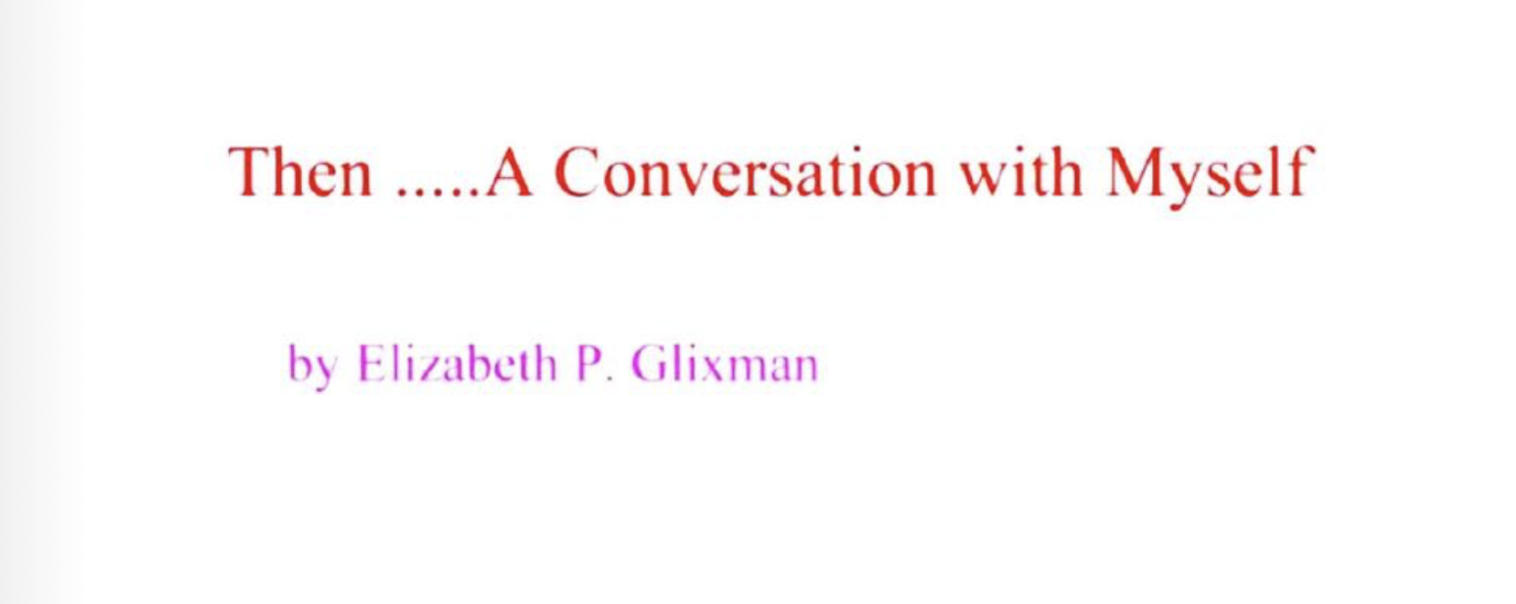
Click here to read the e-book Then: A Conversation With Myself by Elizabeth Glixman
Videos of our many Massachusetts events and panels, 2017 & 2018
- Details
- Last Updated: 06 December 2018 06 December 2018
Boston University, College of Health and Rehabilitation Sciences: Sargent College, October 2018. Introductory remarks and panel discussion. View the video.
Cooley Dickinson Hospital, Northampton MA, May 2018. Introductory remarks and panel discussion. View the video.
Massachusetts State House, April 2018. Introductory remarks and panel discussion. View the video.
Massachusetts Department of Public Health, Boston, March 2018. Introductory remarks and panel discussion. View the video.
Regent Theatre, Arlington MA, Nov. 2017. Introductory remarks and panel discussion. View the video.
Videos of our organization’s members, ME/CFS Alert interviews with Llewellyn King
- Details
- Last Updated: 08 June 2022 08 June 2022
NEW! Interview with Rivka Solomon | ME/CFS Alert Episode 130, January 2, 2022
Rivka Solomon discusses exciting ME/CFS advocacy successes, how advocacy can impact the health of ME/CFS advocates, shortcomings of the NIH, and more.
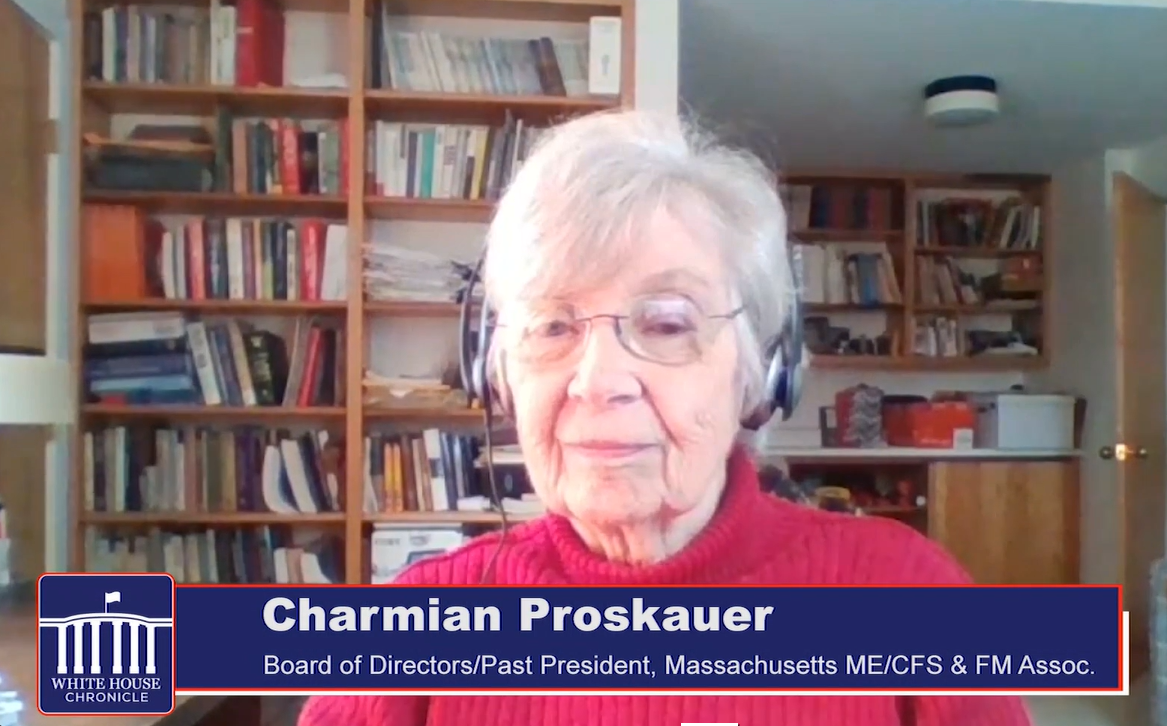
The work of the Massachusetts ME/CFS & FM Association | ME/CFS Alert Episode 114, June 1, 2020
Charmian Proskauer talks about our association's efforts to help people with ME/CFS & FM during the COVID-19 pandemic.
This interview was originally broadcast on White House Chronicle, Llewellyn King's syndicated public affairs program, on PBS on April 23, 2020
Disability and Social Security with ME/CFS, Interview with Robert Robitaille | ME/CFS Alert Episode 100, September 13, 2018
Robert Robitaille discusses his personal experience fighting for disability benefits for his daughter, Robie who has ME.
Living with ME/CFS: Robie's Story | ME/CFS Alert Episode 99, August 26, 2018
Robie talks about her daily life with ME.
Llewellyn King talks with members of our Association in his ME/CFS Alert video series, recorded on March 24, 2017.
Libby's experience with ME | ME/CFS Alert Episode 90, published on June 1, 2017
In this conversation, Libby tells of her long journey from being bedridden with ME to being able to function, albeit at a reduced level from when she got ill. She says that a series of holistic therapies, including a special diet, have been working for her.
The work of the Massachusetts CFIDS/ME & FM Association | Episode 86, published on March 29, 2017
ME/CFS Diagnosis, children with ME, and the medical community with Alan Gurwitt, M.D. (Episode 87), published on April 12, 2017
Children with ME, Being an Advocate and Advice for Parents | ME/CFS Alert Episode 88, published on April 23, 2017
More to come...
Videos from our annual lecture series with ME/CFS leaders and researchers, 2010 to the present
- Details
- Last Updated: 22 December 2022 22 December 2022
View the videos of Dr. Anthony Komaroff 2022 lecture, "MECFS and Long COVID: Emerging Similarities and Why it Matters"
View the videos of our 2021 lecture event, featuring presentations from NIH-funded ME/CFS researchers, including Vicky Whittemore (NIH), Avi Nath (NIH), Ian Lipkin (Columbia), Derya Unutmaz (Jackson Laboratory), Maureen Hanson (Cornell), and Cindy Bateman (Bateman-Horne Center). Also includes a Q&A panel discussion.
View the videos of our 2020 lecture event with the Open Medicine Foundation, including Dr. Ron Tompkins, Dr. David Systrom, Dr. Donna Felsenstein, and a panel discussion.
View the video of Dr. Michael VanElzakker's 2019 lecture, "Investigating ME/CFS at the intersection of the nervous and immune systems," and the video of the question and answer session.
View the video of David Tuller's 2018 lecture, "How Investigative Journalism Succeeds In a Hostile Medical Environment"
View the video of Linda Tannenbaum's 2017 Open Medicine Foundation lecture, "ME/CFS Research Update"
View the video of Dr. Anthony Komaroff's 2016 lecture, "ME/CFS: A Surge of Interest and Knowledge"
View the video of Dr. Khosro Farhad's 2015 lecture, "Fibromyalgia and Small Fiber Polyneuropathy"
View the video of Dr. Anthony Komaroff's 2013 lecture, "The Latest Research on CFS"
View the video of Dr. Jo Solet's 2013 lecture, “The Science of Sleep”
View the video of Dr. Byron Hyde 's 2012 lecture, “Why Doctors Can’t Diagnose and What Tests Should be Considered”
View the video of Dr. David Bell's 2011 lecture, "25 Year Follow-up in Chronic Fatigue Syndrome: Rising Incapacity"
View the video of Dr. Anthony Komaroff's 2010 lecture, "The Latest Research on CFS"
A Conversation with Novelist Roger King
- Details
- Last Updated: 23 January 2016 23 January 2016
The Massachusetts CFIDS/ME & FM Association and the Central Massachusetts Area Support Group had the pleasure to host author Roger King for a book reading on August 4, 2012 in Sturbridge, MA. "Love and Fatigue in America" (University of Wisconsin Press, March 26, 2012) is Roger King's fifth novel, a sometimes humorous, but always inspiring narrative about living with Myalgic Encephalomyelitis (ME), otherwise known as Chronic Fatigue Immune Dysfunction Syndrome or Chronic Fatigue Syndrome (CFIDS/CFS).
M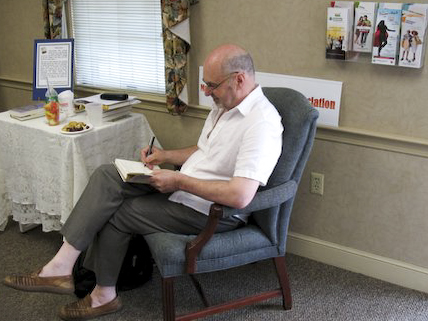 r. King displayed his humor and wit in explaining how he came to write "Love and Fatigue in America." Originally from England, he lived and worked in twenty different countries, primarily for United Nations agencies. He came to America on a teaching stint in Washington State when he soon fell ill. As a stranger in a new country, he thought it would be better to conceal his medical condition while trying to carve out a new life. This process led to new insights about CFS/ME, health and healthcare and countless stories from folks along the way, which ultimately led to this book - in fact, King felt it was unavoidable, being a novelist. He realized that creative writing could communicate with people in a way that scientific papers cannot—already, readers' reaction, primarily from patients, has been generous and sincere.
r. King displayed his humor and wit in explaining how he came to write "Love and Fatigue in America." Originally from England, he lived and worked in twenty different countries, primarily for United Nations agencies. He came to America on a teaching stint in Washington State when he soon fell ill. As a stranger in a new country, he thought it would be better to conceal his medical condition while trying to carve out a new life. This process led to new insights about CFS/ME, health and healthcare and countless stories from folks along the way, which ultimately led to this book - in fact, King felt it was unavoidable, being a novelist. He realized that creative writing could communicate with people in a way that scientific papers cannot—already, readers' reaction, primarily from patients, has been generous and sincere.
Words and pages came to life as King delivered these with the charming lilt of his English accent. He allows the reader, and in this case, the audience to share his thoughts on falling ill. Initially in denial and assuming he would get well as in so many previous instances, such as his bout with malaria, King struggled to figure out what was going on within his body. King's novel adeptly conveys how this insidious illness can and will turn people's lives around—in his case, from this once successful, international teacher and author to the average person struggling with getting around town and through everyday functions.
The book tries to cover a lot of ground in one hundred short chapters which often change from narratives to vignettes and lists-a format that King felt very much reflected the fluctuating nature of CFS. Near the beginning of the book, he explained how he went to the gym after what he thought was a bout with the flu, and how he got dizzy and struggled to say upright. In one line he read "The sitting down doesn't end the going down." Everyone could relate. He decided to just wait it out, attracting as little attention as possible. He was alone by the time he was able to pull himself up, looked around and thought "A good distance down to the carpet. The carpet wants me." Everyone in the room laughed as they could sympathize with the statement. He assumed that a good night's rest might be all he needed to feel better.
Several weeks later and no sign of improvement, he finally dragged himself to the doctor's office, whom he named "Grumpy." Knowing the English socialized health care system, King coined the term "hands in your pockets" medicine. Papers, insurance and otherwise, income and fees had not been part of a doctor's visit -there, the only thing a patient had to do was be sick. Here, he was faced with inordinate amounts of papers as well as costs. Mr. King thought the American medical system was inefficient. Grumpy actually diagnosed CFS, but King had never heard of it.
In the chapter "How to be Ill" King read "Sufferers from Chronic Fatigue Syndrome are not good at being ill. You look well, you're not dying, you're complaint is modest. You are going to be trouble for a long time." Again, knowing laughter from the audience.
He adroitly takes the reader through the complications of decision making using the measure of energy expenditure as the currency. Does he get up and go to the bathroom, take a shower or eat? How do you manage the energy needed to handle a relationship? He navigates his emotions and lets the reader into his thought process.
There was a question and answer period and it was interesting how some of the questions regarding instability of the illness, planning outings or reaction to cancelled commitments were shared by all.
He was asked what it was like the first year when he was a visiting professor in WA and he got ill. He answered "It was a blur." Although Mr. King has done a couple of book readings to the general public, this was the first to a roomful of CFS/ME patients.
Hopefully our appreciation and emotional support will carry through.
Mr. King closed out the afternoon by reading his last chapter titled "The Benefits of Illness" (used with permission).
Your choices are limited
And therefore easier.
Small achievements are automatically promoted as big ones.
You save on shoe leather.
Any woman interested in you is likely to be nice
Though you hope not too nice.
Unpleasant women stay away from you
Though some are confused as to their category.
You learn a lot about the behavior of birds at your bird feeder.
Your illness drives away those frightened by the fragility of life
That is, most men.
You are always home for parcel deliveries.
You keep up with the world news.
Your week never need be empty
While there are doctors to visit.
You watch many films, often twice
Since you forget.
The quality of patience is not strained
Since it's unavoidable.
Your dog need not feel inferior to you
Since you lie down with him.
You appreciate for the first time the pleasures of gardens.
You receive sympathy
Though actually not that much.
You no longer become angry
Because it makes you sick.
You are freed from ambition
Because it makes you sick.
You avoid heartbreak
Because it makes you sick.
You know yourself inside out.
Spiritual wisdom is forced on you
Again and again and again.
You become a connoisseur of repose.
You are motivated to think of others
Since you are so tired of yourself.
You can go to bed in the afternoon
Without a moment's guilt.
You are as sensitive to the air
As is a sailor to wind.
You have the space and time to daydream.
You always possess a perfect excuse
Though you do not use it
Since there is no end to that.
A review of Roger King's book, by Jean Zimmer, is available at our website: Love and Fatigue in America.

